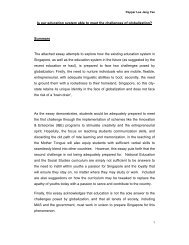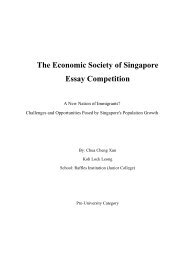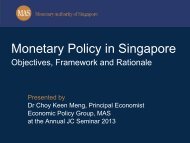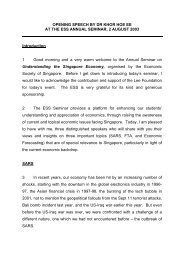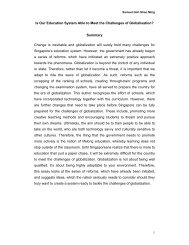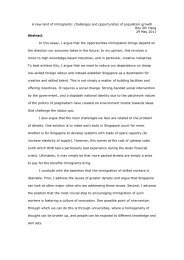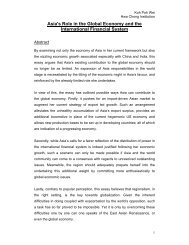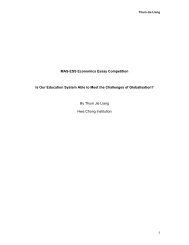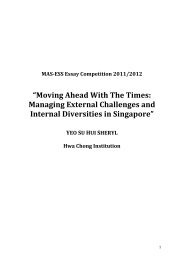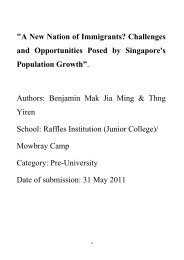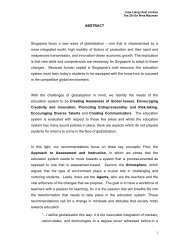the role of the state in an increasingly borderless world - Economic ...
the role of the state in an increasingly borderless world - Economic ...
the role of the state in an increasingly borderless world - Economic ...
- No tags were found...
Create successful ePaper yourself
Turn your PDF publications into a flip-book with our unique Google optimized e-Paper software.
example, its firms enjoy more opportunities abroad but at <strong>the</strong> same time, face more competition<br />
at home. Just as rapid technological progress calls for a smooth reallocation <strong>of</strong> resources with<strong>in</strong><br />
<strong>the</strong> economy, so do <strong>the</strong> daunt<strong>in</strong>g competitive pressures unleashed by globalization. Which<br />
me<strong>an</strong>s that <strong>the</strong> <strong>state</strong> should promote flexible output <strong>an</strong>d factor markets to facilitate this critical<br />
reallocation. To illustrate, <strong>in</strong> countries experienc<strong>in</strong>g a hollow<strong>in</strong>g out <strong>of</strong> <strong>the</strong>ir m<strong>an</strong>ufactur<strong>in</strong>g<br />
sector, deregulat<strong>in</strong>g <strong>an</strong>d liberaliz<strong>in</strong>g <strong>the</strong> markets for services as well as <strong>the</strong> labor market will<br />
promote <strong>the</strong> exp<strong>an</strong>sion <strong>of</strong> service <strong>in</strong>dustries, which tend to be labor-<strong>in</strong>tensive, <strong>an</strong>d redeployment<br />
<strong>of</strong> displaced m<strong>an</strong>ufactur<strong>in</strong>g workers <strong>in</strong>to those <strong>in</strong>dustries.<br />
In some cases, a more direct <strong>an</strong>d active <strong>role</strong> for <strong>the</strong> <strong>state</strong> may be justified. For example,<br />
<strong>the</strong> market may fail to provide enough tra<strong>in</strong><strong>in</strong>g for workers laid <strong>of</strong>f due to cheaper imports or <strong>the</strong><br />
private sector may lack f<strong>in</strong><strong>an</strong>cial resources or scale to make <strong>in</strong>vestments <strong>in</strong> potentially pr<strong>of</strong>itable<br />
but risky new <strong>in</strong>dustries. What matters for a country’s competitiveness is that <strong>the</strong> reallocation <strong>of</strong><br />
resources be quick <strong>an</strong>d effective. If government <strong>in</strong>tervention <strong>in</strong> <strong>an</strong>y shape or capacity facilitates<br />
ra<strong>the</strong>r th<strong>an</strong> h<strong>in</strong>ders this critical movement <strong>of</strong> capital <strong>an</strong>d labor, it is to be welcomed, not<br />
condemned on <strong>the</strong> basis <strong>of</strong> some presumed impotence <strong>of</strong> <strong>the</strong> <strong>state</strong> <strong>in</strong> a <strong>borderless</strong> global<br />
economy. The <strong>state</strong> c<strong>an</strong> thus help <strong>the</strong> economy better adjust to globalization by directly <strong>an</strong>d<br />
<strong>in</strong>directly streng<strong>the</strong>n<strong>in</strong>g <strong>the</strong> economy’s resilience <strong>in</strong> terms <strong>of</strong> uncover<strong>in</strong>g new areas <strong>of</strong><br />
comparative adv<strong>an</strong>tage <strong>an</strong>d re-allocat<strong>in</strong>g resources toward <strong>the</strong>m.<br />
Globalization, like free trade, <strong>in</strong>flicts high costs on some firms <strong>an</strong>d workers even though<br />
it generally benefits <strong>the</strong> economy as a whole. In this connection, <strong>an</strong> <strong>of</strong>ten ignored but<br />
necessary <strong>role</strong> <strong>of</strong> <strong>the</strong> <strong>state</strong> is to champion <strong>the</strong> cause <strong>of</strong> globalization to <strong>the</strong> public. The losses<br />
from globalization tend to be immediate <strong>an</strong>d concentrated while <strong>the</strong> ga<strong>in</strong>s are dist<strong>an</strong>t <strong>an</strong>d<br />
dispersed. It is only natural for a worker whose job has been exported overseas or a farmer<br />
whose livelihood has been destroyed by cheaper imports to be <strong>an</strong>gry. The dislocations from<br />
globalization are real, especially to its short-run victims. In addition to policies that effectively<br />
facilitate adjustment <strong>an</strong>d reallocation, what is required is a more compassionate <strong>state</strong>. This<br />
probably requires build<strong>in</strong>g a stronger social safety net <strong>an</strong>d pay<strong>in</strong>g more attention to <strong>in</strong>come<br />
<strong>in</strong>equality.<br />
5. Conclud<strong>in</strong>g Thoughts<br />
<strong>Economic</strong> globalization, or <strong>the</strong> breakdown <strong>of</strong> barriers to cross-border movements <strong>of</strong><br />
goods <strong>an</strong>d services, capital <strong>an</strong>d labor, has already delivered sizable benefits to <strong>the</strong> <strong>world</strong><br />
economy. To cite just one example, <strong>the</strong> flow <strong>of</strong> capital from capital-abund<strong>an</strong>t rich countries to<br />
capital-poor countries enable firms <strong>in</strong> <strong>the</strong> latter to undertake productive <strong>in</strong>vestments while<br />
provid<strong>in</strong>g a higher rate <strong>of</strong> rate <strong>of</strong> return to savers <strong>in</strong> <strong>the</strong> former. However, <strong>the</strong> distribution <strong>of</strong><br />
globalization’s fruits has been quite uneven across countries as well as with<strong>in</strong> countries, <strong>an</strong>d<br />
this goes a long way toward expla<strong>in</strong><strong>in</strong>g widespread hostility toward globalization.<br />
As we noted earlier, <strong>the</strong> demise <strong>of</strong> <strong>the</strong> <strong>state</strong> under globalization is greatly exaggerated.<br />
In one sense, <strong>the</strong> <strong>state</strong> matters even more <strong>in</strong> a <strong>borderless</strong> <strong>world</strong> economy. To be more specific,<br />
globalization magnifies <strong>the</strong> penalties for bad policies <strong>an</strong>d <strong>the</strong> rewards for good ones because<br />
<strong>the</strong> consequences <strong>of</strong> policies no longer stop at <strong>the</strong> borders. Overvalued exch<strong>an</strong>ge rates not<br />
only keep away foreign <strong>in</strong>vestors, <strong>the</strong>y also drive domestic capital abroad. Reduc<strong>in</strong>g red tape<br />
<strong>an</strong>d corruption unleashes domestic enterprise, <strong>an</strong>d at <strong>the</strong> same time br<strong>in</strong>gs <strong>in</strong> foreign capital<br />
<strong>an</strong>d know-how.<br />
Interest<strong>in</strong>gly, globalization has not perceptibly altered <strong>the</strong> def<strong>in</strong>ition <strong>of</strong> good policies. For<br />
example, some say that globalization forces governments to provide a well-rounded, <strong>world</strong>-class<br />
quality <strong>of</strong> life so as to attract top talent from abroad. But aren’t governments supposed to try to<br />
provide <strong>the</strong> best possible liv<strong>in</strong>g <strong>an</strong>d work<strong>in</strong>g environment for <strong>the</strong>ir citizens <strong>in</strong> <strong>the</strong> first place,<br />
globalization or not The only difference is that success attracts skilled foreigners <strong>in</strong> addition to<br />
mak<strong>in</strong>g citizens happy. And, failure not only makes for unhappy citizens, but citizens who<br />
40



